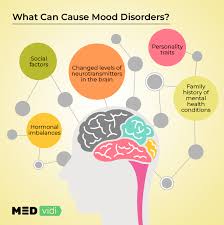Understanding Disorders: Types, Symptoms, and Treatment
Disorders are conditions that affect the mind or body, causing disturbances in normal functioning. They can range from mild to severe and can impact various aspects of a person’s life. Understanding different types of disorders, their symptoms, and available treatments is crucial for proper management and support.
Types of Disorders
There are numerous types of disorders that can affect individuals. Some common categories include:
- Mental Health Disorders: These include conditions such as anxiety disorders, mood disorders (like depression), eating disorders, and schizophrenia.
- Neurological Disorders: Conditions like epilepsy, Alzheimer’s disease, Parkinson’s disease, and multiple sclerosis fall into this category.
- Substance Use Disorders: These involve the misuse of substances like alcohol, drugs, or medications.
- Sleep Disorders: Conditions that disrupt normal sleep patterns such as insomnia, sleep apnea, and narcolepsy.
- Eating Disorders: Conditions like anorexia nervosa, bulimia nervosa, and binge-eating disorder that affect a person’s relationship with food and body image.
Symptoms of Disorders
The symptoms of disorders can vary widely depending on the specific condition. However, some common signs to watch out for include:
- Persistent feelings of sadness or anxiety
- Changes in appetite or weight
- Sleep disturbances
- Irritability or mood swings
- Inability to concentrate or focus
- Memory problems
- Increased use of substances like alcohol or drugs
- Social withdrawal or isolation
ul>
Treatment Options for Disorders
Treatment for disorders often involves a combination of therapies tailored to the individual’s needs. Some common treatment options include:
- Counseling or therapy to address underlying emotional issues
- Medication to manage symptoms
- Lifestyle modifications such as diet changes and exercise
- Social support networks for encouragement and guidance
- In severe cases hospitalization may be necessary
In conclusion
If you suspect that you or someone you know may be experiencing a disorder it is important to seek professional help. Early intervention can lead to better outcomes and improved quality of life for those affected by these conditions.
By understanding the types symptoms and treatment options available we can work towards destigmatizing disorders and providing support to those in need.
Contact your healthcare provider if you have concerns about your mental physical health or well-being.
”
Five Essential Strategies for Managing Health Disorders Effectively
- Maintain open communication with healthcare providers for proper diagnosis and treatment of disorders.
- Educate yourself about the specific disorder to better understand its symptoms and management.
- Seek support from family, friends, or support groups to cope with the challenges of living with a disorder.
- Follow prescribed medication regimens and therapy sessions as recommended by healthcare professionals.
- Practice self-care techniques such as mindfulness, exercise, and healthy eating to manage stress and improve overall well-being.
Maintain open communication with healthcare providers for proper diagnosis and treatment of disorders.
Maintaining open communication with healthcare providers is crucial for the proper diagnosis and treatment of disorders. By sharing your symptoms, concerns, and any changes in your condition with your healthcare team, you enable them to make an accurate assessment and develop an effective treatment plan tailored to your specific needs. Regular check-ins and updates ensure that any adjustments to your treatment can be made promptly, leading to better management of the disorder and improved overall well-being. Remember, your healthcare providers are there to support you on your journey to better health, so do not hesitate to communicate openly and honestly with them.
Educate yourself about the specific disorder to better understand its symptoms and management.
To effectively navigate the challenges associated with a disorder, it is essential to educate oneself about the specific condition. By gaining knowledge about the disorder, including its symptoms and management strategies, individuals can develop a deeper understanding of how it may impact their daily lives. This informed approach not only empowers individuals to recognize early signs and seek appropriate help but also enables them to actively participate in their treatment and overall well-being. Education serves as a powerful tool in fostering self-awareness and resilience in managing the complexities of living with a disorder.
Seek support from family, friends, or support groups to cope with the challenges of living with a disorder.
Seeking support from family, friends, or support groups can be instrumental in coping with the challenges of living with a disorder. Having a strong support system provides emotional comfort, practical assistance, and a sense of belonging that can make a significant difference in managing the day-to-day impact of the disorder. Sharing experiences, receiving encouragement, and gaining insights from others who understand your struggles can help alleviate feelings of isolation and enhance overall well-being. Embracing the understanding and empathy offered by loved ones and peers can foster resilience and empower individuals to navigate their journey towards healing and recovery more effectively.
Follow prescribed medication regimens and therapy sessions as recommended by healthcare professionals.
It is crucial to adhere to prescribed medication regimens and attend therapy sessions as advised by healthcare professionals when managing disorders. Following these recommendations ensures that individuals receive the necessary treatment and support to effectively address their condition. Consistency in medication intake and therapy attendance can significantly improve symptom management, enhance overall well-being, and promote better outcomes in the long run. Trusting the expertise of healthcare providers and actively participating in the prescribed treatment plan are essential steps towards achieving optimal health and recovery.
Practice self-care techniques such as mindfulness, exercise, and healthy eating to manage stress and improve overall well-being.
To effectively manage stress and enhance overall well-being, it is beneficial to incorporate self-care practices into your daily routine. Engaging in mindfulness techniques, regular exercise, and maintaining a balanced and nutritious diet can significantly impact your mental and physical health. Mindfulness helps cultivate a sense of awareness and presence, while exercise promotes the release of endorphins that uplift mood and reduce stress. Additionally, prioritizing healthy eating habits provides essential nutrients for optimal functioning of the body and mind. By embracing these self-care strategies, you can proactively address stressors and nurture a healthier lifestyle.



